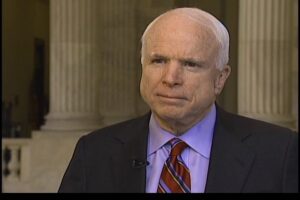‘We Need To Hold Our Noses,’ Buy Russian RD-180 Engines: SecDef
Posted on

Ash Carter
WASHINGTON: Ash Carter made many reporters’ day this morning when he pithily put the case for the Pentagon to continue buying Russian RD-180 rocket engines until the United States has two tested and reliable launch providers capable of replacing the highly reliable and relatively cheap Atlas V built and operated by the United Launch Alliance.
“We can hold our noses, buy RD-180s until that situation is created…and fly Atlases with RD-180s. The alternative is to fly our payloads on Delta, which is technically feasible, but much more expensive. And so, that’s the choice,” Carter told the Senate Appropriation defense subcommittee. “And we have chosen the choice of going Atlas, recognizing the distasteful fact that that necessitates purchases of up to 18 more RD-180 engines.”

Sen. John McCain, SASC chair
You can probably hear Sen. John McCain grinding his teeth from here. The chairman of the Senate Armed Services Committee has made stopping use of the RD-180 a signature campaign of his, driven at least in part by his deep distrust of Russia and by his desire to send a message to Vladimir Putin.
For months the Air Force and some senior Office of Secretary of Defense officials have advocated using 18 RD-180 rocket engines until some combination of ULA, SpaceX and Blue Origin deploy rockets that have demonstrated they are reliable enough to loft hugely expensive and hard-to-replace military and national security satellites into orbit.
Carter also told the SAC-D that he opposed the planned approach of the House Armed Services Committee to authorizing funding for Overseas Contingency Operations.
“In this context, I have serious concerns with a proposal from one of the defense committees to underfund DoD’s overseas warfighting accounts by $18 billion dollars and spend that money on programmatic items we didn’t request. While I don’t expect this committee to consider such a proposal, I have to say that this approach is deeply troubling, and flawed for several reasons,” Carter testified.
“It’s gambling with warfighting money at a time of war – proposing to cut off our troops’ funding in places like Afghanistan, Iraq, and Syria in the middle of the year,” Carter continued. “It would spend money on things that are not DoD’s highest unfunded priorities across the joint force. It buys force structure without the money to sustain it and keep it ready, effectively creating hollow force structure, and working against our efforts to restore readiness. It doesn’t address the much bigger strategic risk DoD faces of $100 billion in looming automatic cuts; in fact, it’s a step in the direction of unraveling the Bipartisan Budget Act, which provided critical stability that DoD needs now and desires for the future.”
Although his position on the OCO funding was clear, Carter’s strategic eye was on the longer game, that of the continuing threat posed to the Defense Department by sequestration. “Unless Congress addresses the years beyond it and heads off sequestration, DoD will face $100 billion in cuts from 2018 to 2021, which would introduce unacceptable risks. So Washington will need to come together once again – not unlike last year, and two years before that – to provide stability and protect our national security.” We’ll all have to wait for the November elections to see how that will shake out.
Subscribe to our newsletter
Promotions, new products and sales. Directly to your inbox.
